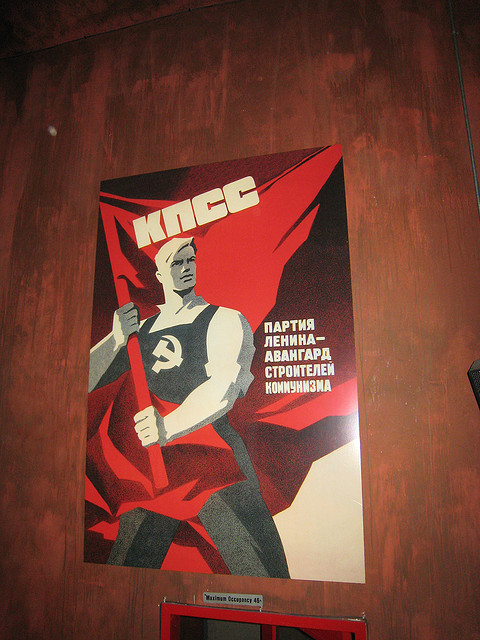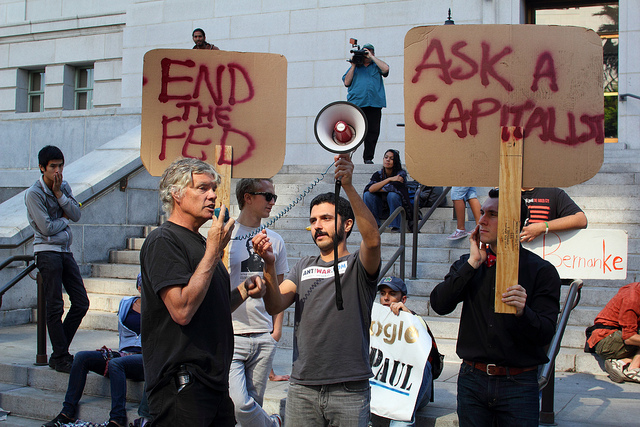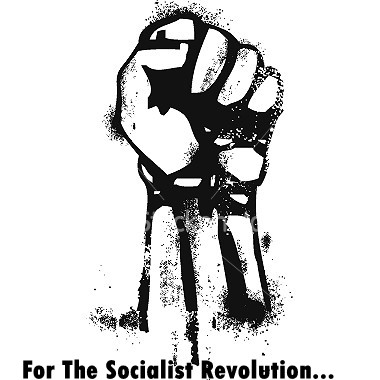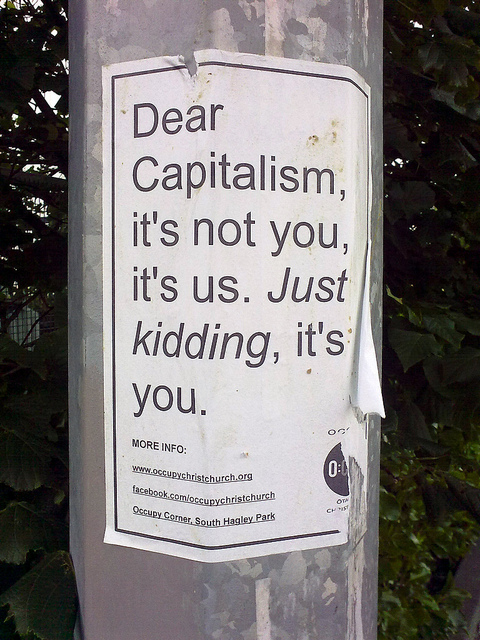|
|||||||||||||
The Philosopher Between the Capitalist and the Communist Chapter 13 : Roz and Pan By Punkerslut
There was a code of honor they had among officers, not only in Babylon, but throughout the world. Whenever Hammurabi's armies would seize land from a nearby kingdom, the generals on each side were cautious for the others' safety, and upon the eventual defeat of one side, the victor gave lashings to his enemies but cigarettes, brandy, a handshake, and an absence of handcuffs to the commanding officer of his enemies. This 'comradery among each and every officer' ended for the first with time -- the first exception to the rule was Rossel. Their plans were clear, "When we are done spitting on his corpse, we shall set it on fire, and the ashes from the most repulsive parts of his body shall be blown into the faces of his family members while they're being tortured." In Athens, there was a similar code of honor among Athenian Communist Party members. "Once you are a party member, you will be accepted at any party meeting for the rest of your life!" was the old Athenian saying. The first exception came, too, for Pannekoek. "Let it hereby be resolved, and be known to the public, -- viz., the 14th and a Halfth, Annual Meeting of the Athenian Communist Party wishes to express to all who shall listen, that Pannekoek is in our eyes a coward and a traitor, an enemy of the working class and a threat to Social Revolution, and all True Marxists will do everything to respite him, his name, his associates, and, if it should advance the cause of Marxism, even his family." Both Roz and Pan heard the threats of their former masters, but they remained in pure resolve to accomplish what they had come here to do -- to guarantee the protection of this city against the aggressions of dominating empires, and, if the power of the people grant it, to also crush and dismantle those empires. In some corners of the globe, Anarchia was simply called the City of Tolerance, because it accepted anyone, no matter the sex, the race, the social background, or even ideology. When a political world dominated by Marxists and Militarists declared war on the tiny nation, Roz and Pan tore apart from their ranks for this reason. They had to come to a completely alien environment and understand a people they never expected to meet. Even though they came from opposite sides, Roz and Pan knew each other to be allies in another way -- nobody else in Anarchia was as different from rest than these two. "Forming the city here was a brilliant plan," Pan said to his audience, Benjamin, Emma, and Roz, "You need a homebase. You need someplace where all true revolutionaries can come when they are weak and seeking an escape from oppression. You need a hideout where you can sleep after fighting out in the forests and oceans. You need some place where your ideas can grow and develop on their own in relation to your experience and foresight, and not under the influence of some government or authority. If you believe in the Revolution and you hold steady in the homebase, then government troops will limit you at worst and guarantee the Revolution at best." "Pan is right," Roz replied, "There needs to be a resupply station for Anarchist soldiers who will also probably be dropping off wounded comrades, and everyone needs to know where it is at all times, while at the same time holding off the oppressive forces from every inch of our city. If they force us into a siege position, where we are completely surrounded and have no access to Akram or the sea, then our defeat is a matter of time. But if we use the forces we have available to us to now to guarantee that our city has that necessary breathing room, then we can really throw both empires right onto their backs! To really do that, we need someplace where any soldier can stop and rest under complete protection, and without that, you will never have what it takes to match a professional army." "Are we really going to arm and send out soldiers regularly?" Emma asked, "Have we gone into the militarization phase of the Revolution already? Why can't we simply improve our fortifications, train all adults in warfare, and prepare the necessary rations and artillery for a siege?" "Surrounded by enemy forces until you starve yourselves to the point of eating your own dead children," Roz spoke, "I have seen it happen. If you allow a siege to happen, you're as good as dead." "But then what's the point of even having a homebase, then?" Benjamin asked, "Why not burn our houses down and always be constantly on the move, never here nor there, living off of nature's abundance, with no permanent property?" "Then you have also lost, but not in the same way," Pan replied, "You must have a people who are your own, who you can move through. The Anarchist citizens here are the only thing you have. You can't simply retreat north to join savaged tribes, east to the Chinese empire, or south and west into the seas themselves -- you need a constant regular supply of both food and troops. Disperse now and whatever civilization you've built will instantly come to an end." "Death by siege or death by dispersal," Emma said, "Which one hurts less?" "Impossible to say," Roz replied. "I'm as terrified of the results of war as the war itself," Benjamin said. "That is a rational response," Pan replied. "You convinced me of the the value of a homebase, tactically and ideologically," Emma replied, "And, that's what we're trying to do, right? To find the right strategy to win the Revolution, right?" "It seems like our best plan, maybe our only plan," Benjamin said, "Hope is a careless thing to receive and a desperate thing to lose. I want to defeat our Authoritarian opponents -- to smash every last one of them to bits." "Then stick to the tactics of a homebase," Roz said, "Use the left hand to shield your heart and the right hand to thrust your weapon into your enemy's throat. Don't fight without the tenacity needed to inflict death. This is going to be no play fight. If our armies are defeated, we can only expect the worst imaginable treatment by the enemy, not just for ourselves but for the people here. This is not a war about national pride or independence or who shall become the next king -- this is the only war that psychologically motivates people to such extremes, the Class War."
"Guerrilla tactics all of the way," Pan said, "You have the Taurus Mountain Range to the south, to guard you against the Babylonians, and to the north, you have so many trickling and trailing streams, that the enemy can't maneuver in your direction without constantly running into bottlenecks and weak points. And the you have the advantage of the streams close to Ankara, which have only a one difficult passage to the Mediterranean Sea, which requires going through two other Seas first. You have the capacity to launch sea vessels against your opponents through Sarkaya River, but for them, it will be incredibly difficult to reach you through the same route. Fight and defend -- when the entire world is against you, then survival is victory." "I hope I didn't miss anything important," a lone voice can be heard in the distance, as the four people look up or over their shoulders, to see an old man wearing a robe. "Philosopher!" Emma shouted. "You're the Philosopher?" Pan said, "I have heard of you. Mostly good things, too." "Indeed," Roz replied, "You would have to be a fool to turn on the guardian of truth, but there are some peculiar rumors about you that I've heard in Babylon." "Well, those rumors are probably mostly true, then," the Philosopher replied, "And I've heard of both you, too. The city could use men like you to help the people defend themselves from those overwhelming, juggernaut empires. I know of your work in Athens, Pan, in organizing the industrial workers to strike, when every other Marxist was against it; and I know of your military strategy in Babylon, Roz, when you organized a militia in a small village that repelled vastly greater numbers. You are both the exact men that Anarchia needs at a time like this." "It's not that we're trying to turn Anarchia into the Militarist-Marxist City," Benjamin said, "We're trying to create it into the place where anyone can come to escape tyranny and work with others fighting for the liberty of all. We're not anti-Marxist or anti-Militarist; we are only anti-State." "What is there to Militarism and Marxism when there is no State?" the Philosopher asked, "Has there ever been a rank awarded to a Militarist, except by the hand of some governor or officer? And can't the same be said of Marxists, except by the hand of some party chairman or party officer?" "Militarism didn't become a part of a civilization for any reason until people realized they needed to defend themselves against the greedy and cruel," Roz replied. "Marxism has the same foundation, except in fighting off night attacks by raiders of villages, it's about fighting off day-and-night shifts at unsafe factories with low pay and an abusive employer," Pan replied. "People have been doing both of those for a long time without either Militarism or Marxism," the Philosopher replied, "Isn't it the role of the state that makes both of your philosophies distinct from what people have been doing since the dawn of civilization?" "We serve no state now, isn't that right?" Roz replied. "We may very well be the first stateless Marxists, too," Pan added. "We've had our own suspicions, too," Emma said, "Militarism and Marxism seem so opposed to Anarchy. When you were both willing to take an oath to defend liberty and to live among us with your families, we had to let you in -- that was simply being responsible to our duties as revolutionaries. But we really were confused, from the very beginning, why any Militarist or Marxist would arrive to the gates of Anarchia seeking an alliance instead of a war." "Some of us even thought you were insincere, that you had motives, that there you were simply rogues acting secretly as servants to your kings," Benjamin said, "But it was important to us to be sincere with our ideals, and to grant refuge to anyone willing to fight under freedom's banner. In a society of free people, what could be the worst harm done by allowing a single person to believe in authority? None, so long as they never have it. We Anarchists certainly have agreed upon that." "We may have our own reasons, too," Roz said, "Reasons that aren't political or pecuniary. Every individual has their own path; everyone makes their own decisions. For us, we might be here for a very important reason, something that strikes very deeply close to the heart -- but if either Hammurabi, Solon, or even you the Anarchists heard it, you'd consider it a mere trifle, something entirely outside of the scope of the conflict altogether. Anarchia seemed like the best place for someone who acts by themselves as an individual." "Marxism has always preached that Anarchism is its end purpose," Pan said, "We only seek power now so that we can defend ourselves and destroy Capitalism. Nobody wants to live under a state, whether it's Hammurabi's or Solon's. That's why we're here today -- so that no future generations will be the slaves of those monsters. The state, as envisioned by Marxism, can take on some particularly amiable features, as it may be as simple as any decision-making organization that has control over the land and natural resources. Solon has made his state into an absolutist-benevolent monarchy. His Marxism is the cruel kind." "When ideas mean nothing, people mean everything," the Philosopher replied. "What do you mean by that?" Benjamin asked. "Maybe you're not really Anarchists or Militarists or Socialists or Unionists or Capitalists," the Philosopher said, "Maybe there happens to be about 150 different types of human personalities, maybe there's 100 of them, or maybe there's a thousand of them. Or maybe there's just a handful of them. And just maybe, you all have the same one." "What? With the amount of diversity and tolerance in our city?" Benjamin said, "There are cults based on sex orgies and psychedelic drug use that make good neighbors with churches and synagogues." "But how many of the former do you have compared to the latter?" the Philosopher asked. "What? What would that have to do with anything?" Benjamin asked, "You're making no sense at all, Philosopher. Speak more clearly, so that we can understand." "You have plenty of rebels here, don't you?" the Philosopher asked. "We most certainly do!" Emma replied.
"Yes, I can see your point," Emma said, "But Philosopher, tell me, is that what you've come to tell us? That we're not making a Revolution of Anarchists, but a Revolution of Rebels?" "Haven't you thought that your Revolution has robbed the world of its revolutionaries, that every town and city from Carthage to Beijing has lost its dissident voices and disgruntled agitators?" "You cannot kill your opponent by lobbing twenty or thirty dull sticks at him!" Emma said, "You need one, single, sharpened point to pierce a critical organ of the body and to do it all the time your enemy is trying to do worse to you! How do you expect any type of Revolution to come about unless all of the world's revolutionaries swell up into a single, powerful mass?" "Do you really expect to make a Revolution when you get all of your ideas from Marxists and Militarists?" the Philosopher replied. "And is there anything you really have against us?" Roz asked. "We've given your our testimony and have given draped it in our oaths," Pan said, "What is it about Militarism and Marxism that would make the Anarchist City have no home for us?" "The state," the Philosopher replied, "That's all. What you two want, and what everyone else around you wants, are very different. That's all." "You're going to drive us apart for that?" Roz said. "Do you really think we've committed some crime that we should be exiled and ostracized from here?" Pan asked. "I'm not the type of person to ask anyone to leave their refuge," the Philosopher replied, "And more than that, Philosophy could never make me into the type of person who tells others what to do. But I am the type of person who talks loudly whenever I hear a contradiction. I am the predator of contradictions." Then, after the Philosopher looked up at a cloud, darted his vision around in an uncoordinated space, and then returned to his listeners, did he finally say, "Perhaps it is... my personality type." The Philosopher smiled at his audience, without much response from either Pan or Roz, while both of the Anarchists were laughing. "If any contradiction exists, it has to be the one that everyone talks about," Benjamin said, "You know, the one between Capitalism and Communism. We've destroyed that contradiction here. We've made our conflict not into one of private property versus public property, but of liberty versus slavery. You know that's what sets us citizens of Anarchia apart from citizens of other cities, right?" "Ignoring someone's protests just because they come from a different background, ideologically or socially or culturally or racially or politically -- that is the greatest contradiction to Anarchism," Emma said, "If you must hunt out a lie, stalk wherever they tell the people to believe in their village, their city, their country, their nation, their continent, or their race! You will be so overburdened with contradictions, that you probably won't be able to say a thing." "If your logic is bad," the Philosopher said, "Do not begin its defense by mentioning someone else's logic with just as poor quality." "There has been so much vicious hatred between Communist and Capitalist, in every nation and in every time," Benjamin said, "We want to prove, once and for all, that the antagonism within humanity is not between propertied and propertyless, but between governing and governed. If the Communist World and the Capitalist World are so suicidal enough that they would rather destroy each other than live, then let them meet here, at the borders of anarchy. End the animosity finally! Let there be a war!" "Aren't you paying attention?" the Philosopher said, "Now you're two nations almost hopelessly opposed to each in bitterness and hatred; with war, it will become an honor among both peoples to ravage and viciously destroy the families of their enemies, young and old, sick and able, left-wing and right-wing. You at least had the chance of dialogue before; with war, you don't have the chance of anything."
"And what makes you think that the clouds have nothing important to say?" the Philosopher replied. "It's not just a chance at victory," Pan added in, "It's a chance at guaranteeing liberty for ourselves and the future -- a chance at defeating and humiliating those who would keep us in perpetual oppression. Compared to our enemy, we may be tiny and insignificant and small, but so is the tip of a knife compared to the whole weapon. We are not making one last stand so that we can be heroes to the future. We are here to fight so that there still can be a future." "You're building a future by getting into a fight?" the Philosopher asked. "Tell me one movement throughout all history that has ever made any impact on humanity without the use of force," Pan demanded. "Not authoritarian force, naturally," Benjamin added in the disclaimer. "Fighting has made up the substance of all human change. Not conflict, that ends in petty squabbles between intellectuals, but actual fighting -- actual violence," Roz reinforced. "Violence carefully decided upon and chosen by the self-organized, autonomous armies of the working class of the Anarchist City," Emma added in another disclaimer. "I'm not here to tell you to surrender, to squabble, to beg for mercy from kings and queens," the Philosopher said, "I'm not here as your enemy. Any enemies you have are either next to your hearts or a thousand miles away. But when I tell you that this is a war that has split the world into halves, your only assurances to me have been your own doubts." "Not a doubt here, not in the Army," Roz replied, "And not a doubt in our weapons." "Nor in the Communist Party, and our leaflets," Pan added in. "Truth was born from skepticism," the Philosopher said. "How is that even possible?" Roz asked. "Yeah," Pan said, "Isn't skepticism the doubting of knowledge, and isn't truth the knowledge of things? How could there be doubt of knowledge, before there was knowledge?" "Ignorance precedes knowing," the Philosopher said, "But if what you think you know is wrong, then what facilitated that transition from ignorance to knowing will be just as likely to bring you straight back to ignorance." "That is the least coherent thing you have yet said," Roz replied. "Revolutions need organization, and here in -- " Pan stopped speaking, as a soldier of the Anarchist Army carrying an envelope ran towards the meeting of thinkers. "Important news from the front!" the soldier was gasping as he spoke, "There's news of three invasion forces headed in our direction. The Greeks are launching an army from the North, through Istanbul... and..." still gasping for breath, "The Babylonians are launching an attack from the south, through Jordan. The third force..." almost regaining his strength, "... the third force is coming from the west, landing by means of sea, an army made up of so-called 'Coalition Forces'. Their regulars come from the a number of insignificant allies of both Hammurabi and Solon. Egyptians, Italians, Cretians, Jordanians, Turks, Persians, you name it, the third force has everything, and barely a handful of Babylonians or Greeks. Their combined forces outnumber ours by at least ten to one." "We don't have time for conversation," Roz said, "We only have time to defend those who seek out civilization as a refuge for liberty. We will split the Anarchist Army into thirds. I will take the First Anarchist Army north, to meet the forces of Solon and the Greeks." "I will take the Second Anarchist Army south, to meet and destroy the forces of Hammurabi," Pan said. "The Third Anarchist Army should be taken by you two, Emma and Benjamin," Roz said, "Head west and meet the Coalition forces before they've even landed on the beaches. Crush every last one of them, with as few losses as possible. We are tremendously outnumbered, so, I have one suggestion to you -- after your first engagement, accept the policy of strategic retreat. Your army is our defensive unit, ours are the offensive units. If you can defend your way all the way to the point of walling up your own houses for inner-city fighting, we will be just behind the enemy, ready to pounce on their backs and cut their throats." "Strategic retreat is the exact phrase to describe it," Pan added in, "We have to face attacks from three different directions. We can get past these near-insurmountable odds, if only we can distract significant portions of enemy troops all at the same time. Coordination, effort, and work is demanded." "Understood," Benjamin said. "For the liberty of the people," Emma said, "And you, Philosopher, where will you be during all of this? What does the World's Thinker believe in?" "I am the guardian of truth," the Philosopher said, "We are in a city that was a small village only a few months ago, and we are about to get crushed between the might of two great empires. There is nothing that could make someone like myself leave the cause -- not here, not now." That night, when rallying the troops, Emma's inspiration resounded through the ranks, "It is up to us to unite together now! If we fail, our children will wear the iron collars of either Solon or Hammurabi -- whichever king proves more ruthless by defeating the other!" With Roz and Pan came the Militarists and the Marxists, with the Militarists establishing their own academy, equipped with a training ground and numerous banners declaring "We are fighting for your liberty," and the Marxists, too, established their own party headquarters, equipped with translators in twenty languages and a large sign mirroring the academy's, "We are thinking for your liberty." They were an unusual element in the city, but they were not wholly and completely rejected by the Anarchians. In every other city for a thousand miles, Militarists beat up Marxists with club and rifle butt, and Marxists beat up Militarists with pamphlet and book -- but in Anarchia, the Marxists and the Militarists were the two groups with the greatest affinity, as they both were unlikely candidates for citizenry who were accepted at the same moment. It was a time where Tolerance was at its height in Anarchia. Benjamin even hit the pipe once or twice, and Emma even tried prayer. The best intoxication that follows a victory in defense of liberty is liberty itself. Everywhere else in the world, the defeats of Hammurabi and Solon's forces intensified their hatred of the opposing sides, and everywhere, from village to city, police officers were hanging suspected "Capitalists" or suspected "Communists", with little more jury than a rope and a tree, whether their badge was issued by the Athenian Communist Party or the Babylonian State. Communist and Capitalist meant almost nothing inside the walls of the Anarchist City, and outside, it meant almost everything.
|







